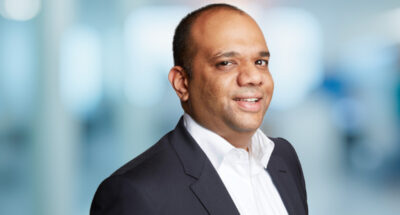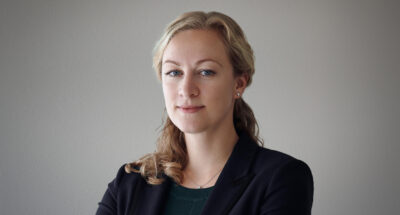
Holcim’s Ram Muthu: Can circular construction scale?
Holcim’s Ram Muthu on circularity, EU regulation, and what it really takes to decarbonize cement at industrial scale....
June 12, 2025 • by Cynthia Hansen in Podcasts • 
Cynthia Hansen of the Adecco Group’s global Innovation Foundation speaks to Richard Edelman, CEO of Edelman, the global communications company, about trust and uncertainty in society and business....
Apple SpotifyThe more you can explain how your business fits into society and what you do, the better. You have an outsized importance in people's lives.
Cynthia Hansen: We’ve been thinking about geopolitical and economic uncertainty and how people are quick to blame institutions when they do not feel heard. What underpins this feeling of disenfranchisement, and how does that relate to trust?
Richard Edelman: We’re living in an age of grievance, and grievance is a lack of belief in the future. It’s also a sense that the system doesn’t work, that I don’t have an equal chance and that it’s rigged. It’s reinforced by an immensely changed information ecosystem, where two-thirds of our respondents across 28 countries (2025 Edelman Trust Barometer) believe journalists lie to them to achieve their goals, such as clicks. It’s a rebellion against the establishment. In 50 elections in the past year, most were won by the opposition because they were different: we want change.
Where do you think this sense of disenfranchisement comes from? Has it changed significantly over the last decades? How did we get here?
Three or four fundamental changes have occurred. The first is a lack of belief in top-down authority figures. It started with the Iraq war. Then we had the global financial crisis in 2008, in which you had a loss of belief in capitalism and CEOs. Then with COVID-19, you saw the destruction of belief in science and government institutions because of a sense of the rushing of vaccines and lockdowns.
Then, this incredible dispersion of authority of the media: the decline of local newspapers and the rise of podcasters – all of whom have a sense of proximity to me as opposed to being far away. Trust has gone local; that’s the thesis. Instead of being derived from top-down or even peer-to-peer, it’s people close to me.
Gen Z has established its own health ecosystem of information: social, friends, and family, rejecting anything that’s top-down and establishment.
How does hyper-personalization of information impact trust?
We began with thought bubbles. If I was on the left, I read a certain thing. If I was on the right, I read a certain thing. It’s morphed into a self-reference: I’m my own content creator. As a patient, I believe that, through search, I can find information that makes me as informed as my doctor about health outcomes. I’m rejecting expertise because my experience is as important as a professional’s lifetime of experience.
I spoke in Davos this year with the President of Dartmouth University. She feels that her students, the kids in high school during COVID-19, lost the ability to engage, particularly with people who don’t share their beliefs or points of view. If I can no longer have a dialogue with you because you don’t share my views, does that mean I don’t trust you? And how might I regain that trust or re-establish that ability to engage?
Research by Cambridge University and Google indicates that a Gen Z person reads an article by looking at the headline, reading the comments, and then deciding whether the article is fair – and only then reading the article. It speaks to a crowdsourcing of opinion. Gen Z has established its own health ecosystem of information: social, friends, and family, rejecting anything that’s top-down and establishment.
Peter Maurer, the former President of the International Committee of the Red Cross, once said that almost all conflict comes back to a sense of fairness. What does that mean for the way people make decisions and form opinions?
Fairness in a post-George Floyd world meant equity and, in a certain way, an ability to make up for historical shortcomings, such as racism, etc. That’s been recast as the need to have opportunity. We can’t guarantee outcomes, but we can ensure people get a fair shot. Our research shows deep skepticism among the young that they’re going to do as well as the previous generation. Only 9% of French and 15% of Germans believe they’ll be better off than their parents. It’s the first generation that doesn’t believe they’re going to do better. That’s what creates this whole theory of hostile activism. More than half of Gen Z believe they are entitled to damage property, spread disinformation, or any other way to show their dissatisfaction. That’s a stunning finding that, in some way, may explain the horrible shooting of the insurance executive (UnitedHealthcare CEO Brian Thompson) in New York.
What do you think leaders need to be comfortable with ambiguity while giving people confidence that we’re going in the right direction?
It’s a tricky balance. The presumption has always been that innovation is a public good, and this generation doesn’t see that. What this generation sees is that AI is going to take away the jobs of programmers, agency creatives, or any number of others. That there’s been a lot of lip service, but no specific program oriented to upskilling, so they’re going to be left behind. Put that on top of fears of climate change, inflation, and downward economic mobility, and you’ve got a very toxic brew.
The solution that many politicians put forward is: let’s go back to the good old times. Let’s go back to nationalism and local sourcing. That’s certainly a questionable policy program, but that nationalism is on the rise is true and that people are agitated is also true. It’s fascinating to see that business continues to be the most trusted institution by far, significantly more competent – like 50 points – and 30 points more ethical than government in most cases. It’s also fascinating to see that single-party states perform much better on trust in developing countries than democracies.
Business has to be steady, keep its values, recognize it's not a political institution, and that CEOs are not elected.
Are leaders in the business sector better equipped to lead through this ambiguity than those in the public sector?
The default in the last three years has been: we have problems, and business has to solve them. There’s been a reset in the last six months. Business can’t solve all these things; a lot has to be done by government. Business can contribute to diversity and sustainability but is not a social welfare organization. Government has to perform better. You’re seeing a much more activist government, certainly in the US and seemingly in Canada and Mexico. Government leaders have gotten the message: pick it up.
If you were to advise leaders on what they need to do to create more stability, a stronger way forward – a North Star – what would it be?
The first is to go out and listen. Don’t just talk. Be a more multinational, polynational person. After 7 October (the 2023 Hamas attack on Israel), I wrote a blog post and mourned the murder of those Israelis. I also said I know what’s coming, and I’m sure there’s going to be a lot of loss on the other side of the border, and I mourn that too. But my employees, especially in the UAE and Saudi (Arabia), felt the blog was too oriented to the Israeli side. So I sat with them and listened to their stories. I heard the story of a guy whose family lost 20 people in a church in Gaza. And I said, ‘I cry with you’. I only give you an anecdote because I think it’s complicated. You have to go and listen to this storytelling from your employees.
The second thing for leaders is trust. In a way, you’re in loco parentis. You’ve got to put your arms around your people, and you must talk to them frequently. I do it through my blog and by having updates on the business: find every opportunity to do that.
And lastly, many CEOs feel most comfortable just talking about business, so the more you can explain how your business fits into society and what you do, the better. You have an outsized importance in people’s lives.
What would the world look like if more CEOs and leaders could take this approach?
I’m not arguing for some utopian world without government. Government has to be the referee, set the playing field, and ensure that there are good rules and that they’re followed. They have to work together on climate issues and things like that. But business is much more flexible and faster. Business had a great COVID-19 because it delivered PPE and vaccines and kept people working. Business has to be steady on its feet, keep its values, recognize it’s not a political institution, and that CEOs are not elected. Your people and your customers need you – they need to feel you.
Do you feel optimistic about the direction we’re going?
I’m always optimistic. I always find the pony in the pile of “you know what”. I feel optimistic because AI can be an incredible accelerator of knowledge. Think about it. If there are 500,000 possible drug compounds, you can use AI to shorten the period of experimentation massively. We’re going to have much better outcomes and make people healthier. Rinse and repeat with AI. We have to make people faster and smarter, but AI is going to enable our people in the junior category to do more. In our case, I’m looking forward to competing. We’re ahead with advertising and can do a thousand pieces of content for a client a month. I couldn’t have done that before. So, it’s going to be Darwinian, but I love that.

CEO of Edelman

Managing Director of the Innovation Foundation, empowered by the Adecco Group
Cynthia Hansen is Managing Director of the Innovation Foundation, empowered by the Adecco Group. She has a vast background in the private and non-profit sectors and joined the Adecco Group in 2017 to start the Innovation Foundation and spearhead social innovation. Her areas of expertise include strategy, change management, social impact, and partnership.

January 27, 2026 • by Julia Binder, Knut Haanaes in Podcasts
Holcim’s Ram Muthu on circularity, EU regulation, and what it really takes to decarbonize cement at industrial scale....

January 23, 2026 • by David Bach, Julia Binder in Podcasts
Live from Davos: IMD’s Julia Binder and David Bach cut through the headlines on geopolitics, AI, energy – and competing visions for the international order....

January 13, 2026 • by Julia Binder, Knut Haanaes in Podcasts
IMD’s Inside the Transition hosts Pictet CSO Marie-Laure Schaufelberger to explore how finance drives the energy transition and ESG strategies....

January 8, 2026 • by David Bach, Felix Zeltner in Podcasts
In this episode of Leaders Unplugged, IMD President David Bach speaks with Rolf Habben Jansen, CEO of Hapag-Lloyd, about leading a global shipping giant through geopolitical tension, climate pressure, and permanent uncertainty,...
Explore first person business intelligence from top minds curated for a global executive audience